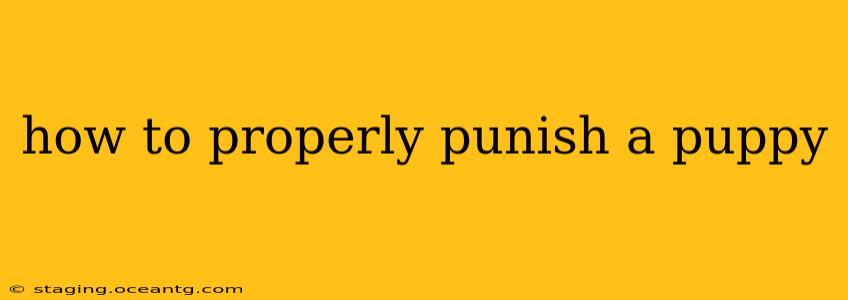How to Properly Correct Puppy Misbehavior: Positive Reinforcement Trumps Punishment
Training a puppy is a rewarding but challenging journey. While it's natural to feel frustrated when your furry friend misbehaves, resorting to harsh punishment is detrimental to their development and your relationship. Effective puppy training relies on positive reinforcement, building a strong bond based on trust and understanding. This article explores effective methods for correcting unwanted behaviors without resorting to punishment.
Understanding Puppy Behavior:
Before diving into correction techniques, it's crucial to understand why puppies misbehave. Puppies aren't intentionally trying to annoy you; their actions often stem from:
- Lack of training: They haven't yet learned what's acceptable and unacceptable.
- Exploration: Puppies use their mouths to explore their environment, leading to chewing and biting.
- Fear or anxiety: Uncomfortable situations can trigger unwanted behaviors.
- Excitement or overstimulation: Puppies can become overly enthusiastic and act out.
What NOT to Do:
Avoid these methods, as they are harmful and counterproductive:
- Physical punishment: Hitting, kicking, or shaking your puppy will only create fear and aggression. It damages your bond and can lead to behavioral problems.
- Verbal abuse: Yelling or screaming is stressful and ineffective. Your puppy won't understand your anger, only that you're upset.
- Dominance-based training: Methods focusing on establishing dominance through harsh techniques are outdated and cruel.
How to Correct Puppy Misbehavior Positively:
Positive reinforcement focuses on rewarding good behavior rather than punishing bad behavior. Here’s how to apply it:
- Consistent training: Establish clear rules and expectations from day one. Use consistent commands and reward desired actions immediately.
- Positive reinforcement: Reward good behavior with treats, praise, or toys. Timing is crucial; reward immediately after the desired action.
- Redirection: If your puppy is chewing on something inappropriate, redirect their attention to an appropriate chew toy.
- Ignoring unwanted behavior: Sometimes, the best approach is to ignore minor misbehaviors, especially if attention-seeking is the root cause. If they aren't getting a reaction, they're less likely to repeat it.
- Prevention: Manage your puppy's environment to prevent problematic behaviors. Remove tempting items, provide ample exercise, and supervise them closely.
- Crate training: A crate provides a safe and secure space for your puppy, helping with housetraining and reducing anxiety.
- Professional help: If you're struggling with serious behavioral issues, don't hesitate to consult a certified professional dog trainer or veterinary behaviorist.
What to do if your puppy bites:
Puppies bite as a natural part of their development. However, it's crucial to teach them bite inhibition:
- Yelp: If your puppy bites too hard, let out a high-pitched yelp, mimicking a puppy's cry of pain. This often startles them and teaches them to be gentler.
- Time-out: If the biting continues, calmly remove yourself from the situation for a few minutes.
- Redirection: Offer a chew toy as a substitute for biting your hands or clothing.
House Training Challenges:
House training is a common challenge. Here's how to manage accidents effectively:
- Consistency: Establish a regular potty schedule. Take your puppy out frequently, especially after waking up, eating, and playing.
- Positive reinforcement: Reward them immediately after successful potty breaks outside.
- Cleaning up accidents: Clean thoroughly with an enzymatic cleaner to remove odors that may attract your puppy back to the same spot.
- Never punish accidents: Your puppy won't associate punishment with the accident if it happened hours ago.
Effective Punishment Alternatives:
Instead of punishment, focus on:
- Interrupting and redirecting: If your puppy is doing something wrong, gently interrupt them and redirect their attention to a more appropriate activity.
- Providing adequate exercise and mental stimulation: A tired puppy is less likely to get into trouble. Provide plenty of opportunities for play, training, and exploration.
Remember, building a strong, positive relationship with your puppy is key to successful training. Focus on rewarding good behavior and creating a safe, stimulating environment. If you ever find yourself struggling, reach out to a qualified professional. They can provide personalized guidance and support to help you and your puppy thrive.
